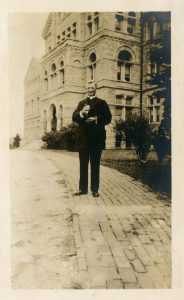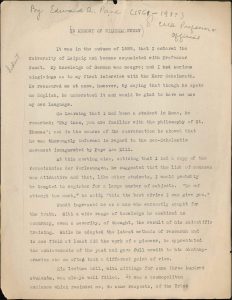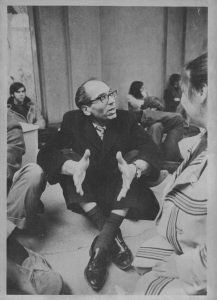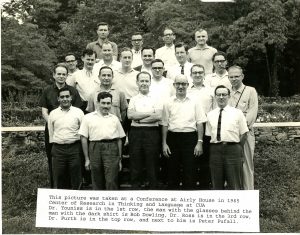
It’s Paris in 1889. A 26-year old priest with a doctoral degree in sacred theology named Father Edward Pace is readying himself for a faculty position in philosophy at the newly established Catholic University of America in Washington, D.C. He happens to come across a secondhand copy of Wilhelm Wundt’s 1874 Principles of Physiological Psychology and is so inspired by this pioneer thinker’s presentation of ideas that he resolves to study with the author himself at the University of Leipzig.
In fact, Pace was the first Catholic priest and one of only six Americans to have studied with Wundt, the founder of experimental psychology. Of one course, he wrote, “For us Americans, the exercises of this seminar have been a revelation of German slowness and German patience. The very men who are preparing to measure sensations by the thousandth part of a second seem quite oblivious to the flight of days and hours.”¹
Shortly after receiving his doctoral degree from the University of Leipzig in 1891, Pace began teaching what he’d learned in Europe as a professor at Catholic University, where he also introduced the earliest psychology laboratory of its kind in any Catholic institution.² In doing so, he was following the advisement of the future Cardinal Desire Mercier, who founded the psychology department at the University of Louvain in Belgium in 1891; as Cardinal Mercier put it: “Psychology is undergoing a transformation from which we would be blameworthy to remain aloof… here is a young, contemporary science, which in itself is neither spiritualistic nor materialistic. If we do not take part in it, the psychology of the future will develop without us, and there is every reason to believe, against us.”³

The first psychology courses offered in 1892 were taught in theology, and later under the discipline of philosophy. In 1905 the Department of Psychology was set up within the School of Philosophy. As onetime department chair Bruce M. Ross noted, the early study of academic psychology was “largely confined to the description and measurement of sensation and perception.” Hence Pace’s work focused on pain and fluctuations of attention.⁴
Pace soon went on to greater administrative duties, which drew him into the field of education at the University, but psychology’s career at CUA continued with one of Pace’s students, Thomas Verner Moore. Moore, a Paulist father, then a Benedictine, and finally a Carthusian monk at the time of his passing, eventually chaired the expanding department, served as a psychiatrist with the Armed Forces during the First World War, became Superintendent of St. Elizabeth’s Hospital in Washington, D.C., and established a school for mentally challenged children, St. Gertrude’s School of Arts and Crafts. Moore’s clinic became a model after which other Catholic clinics were patterned.⁵
By 1960, the Department of Psychology was well established, and housed in the third floor of McMahon Hall. James Youniss, who arrived that year to study in the doctoral program, describes the offices as follows: “At the top of the two stairwells in the center were large mahogany-paneled doors that opened into a vast space with 20-foot ceilings, large glass museum cases containing laboratory instruments going back to Wundt, and book cases with volumes in English, German, and French.”⁶

Aside from the interesting physical details, the description underscores the department’s cosmopolitan roots in experimental psychology. By this time, moreover, the program offered the doctoral degree. The department elected to appoint Hans Furth as department chair and hire faculty for several new programs, including social psychology, personality, counseling and human development. Furth, whose extraordinary background included escape from his Nazi-besieged Austrian homeland, training as a concert pianist at the Royal Academy of Music in London and, coincidentally given his predecessor Thomas Verner Moore’s experience, 10 years in a Carthusian monastery, brought a unique interest to the department: study of the deaf with a deep interest in the work of Jean Piaget, whose works were not yet widely accepted in the U.S. Furth’s publications made accessible Piaget’s largely abstract ideas, including the notion that children left to their own devices continually rethink their understanding of the world and are not empty vessels waiting for educators to fill them with knowledge. He found that far from impeding their development, deaf peoples’ use of sign language, highly discouraged in deaf education at the time, actually spurred healthier development among them. His work underscored the need for sign-language education among the deaf, today commonly accepted.
Furth, Youniss, and Bruce Ross (both Ross and Youniss later went on to chair the department), made Piaget’s theory the centerpiece of the Ph.D. program in developmental psychology, which graduated many influential students, many of whom went on to academic careers. They also established the Center for Thinking and Language, for which they were awarded an NIH grant for a conference on cognition and language in the 1960s. In 1970 the University awarded Piaget an honorary doctorate for his work, a fitting tribute to a scholar whose influence ran so deeply through the department.

The Department of Psychology graduated dozens of students who went on to careers in places like the National Institute of Mental Health, various state mental health institutions, U.S. Department of Health and Human Services, Covenant House, the Veterans Administration, and in the faculty at universities across the country.
At the 125th Anniversary celebration of the Department of Psychology in October, 2017, James Youniss referred to remarks made by Cardinal James Gibbons during the department’s 25th anniversary celebration a century earlier. Gibbons spoke of the turmoil of the times, the poverty of the immigrants who had recently arrived from Europe, the world war then engulfing Europe and involving America, and the many social issues that needed addressing. He noted that “from the very nature of our condition upon this earth, from our progress in knowledge, our political organization and our economic condition…” the human state has “made possible and necessary the social sciences” and “demanded a more systematic inquiry than ever before into our human relations… the structure of society, the origin and history of institutions, the cases of decline, and the possibility of betterment…” Youniss noted that Cardinal Gibbons’ insightful comments applied then and still do, a century later.
Edward Aloysius Pace Papers finding aid: http://archives.lib.cua.edu/findingaid/pace.cfm
¹Virginia Staudt Sexton, “Edward Aloysius Pace,” Psychological Research, 42 (1980), 39-47, 40.
²Helen Peixotto, “A History of Psychology at Catholic University,” Catholic Educational Review , April, 1969, 844-849, 844; Bruce M. Ross, “Development of Psychology at The Catholic University of America,” Journal of the Washington Academy of Sciences, (September 1994), 141
³Henry Misiak and Virginia Staudt, Catholics in Psychology, A Historical Survey (New York: McGraw-Hill Book Company, 1954), 34-35.
⁴Peixotto, 846-847, Ross, 135.
⁵Peixotto, 846-847, Ross, 148-149, 155.
⁶James Youniss, “CUA, Psychology, and the Last Half of the Twentieth Century,” delivered on 125th anniversary celebration of the Department of Psychology, The Catholic University of America, October 14, 2017, in author’s possession.
